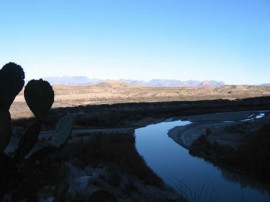
An interesting discussion last week about the preservation of river basins, interesting not from the point of view of hydrogeology (a subject that doesn’t do much for me, I confess) but from the perspective of the impact of geography on politics (a subject that interests me very much).
The starting point was the suggestion that river basins are running into deficit, and thus drying out. A river basin is the area of land around a river within the watershed, so that all the rain that falls in this area will flow down the same river towards the sea. River basins can be very large – the Amazon river basin, for example – but they are each separate from the next. Water doesn’t flow from one to the next, so that deficits and surpluses can exist side by side.
Factors that drive a river basin into deficit include a high level of use in industry, households and, overwhelmingly, agriculture. Irrigation makes the biggest demands on water supplies – the Aral sea is drying up as a result of the irrigation of the central Asian cotton fields.
The interesting question is not that water supplies dry up if they are overused, but how to prevent them from being overused. The crucial point is that the geographical unit in which the necessary action has to be taken is the river basin, a wholly natural feature. Notions such as national borders are irrelevant.
For example, branches of the river Nile rise variously in Ethiopia and Uganda, and it flows the length of the Sudan before reaching Egypt and then the sea. The Egyptians therefore very vulnerable to interruptions to the river flow if they take place upstream. Climate change might spur such interruptions: a major cause of the conflict in Darfur, on the edge of the Nile river basin, is precisely the shortage of arable land. Any decision about the management of the Nile ought to be taken collectively by all the different interests involved. At present, of course, that collective decision-making is impossible.
The issue gains added pathos when one notes that rivers, far from uniting political communities, serve as borders between them. The Rhine, the Oder, the Sava and the Drina, all mark where one country ends and another one begins. This is not surprising – the London borough of Lambeth in which I live ends at the Thames – as rivers make clear and unambiguous borders. However, this natural tendency to divide up the land along rivers is in conflict with the natural need to take collective decisions involving both sides of the river together. This amounts to a perfect example of the problems of nationalism in politics, and how legitimacy and effectiveness must work together in the political institutions.
Too often, people who live in a river basin do not recognise their shared interest in managing its water resources and lack the political institutions to do so. These interests that are shared beyond the level of the existing states are an important reason for federalism.
